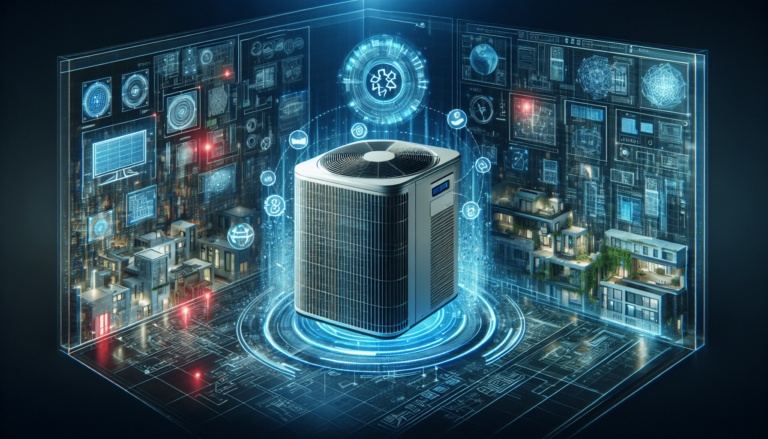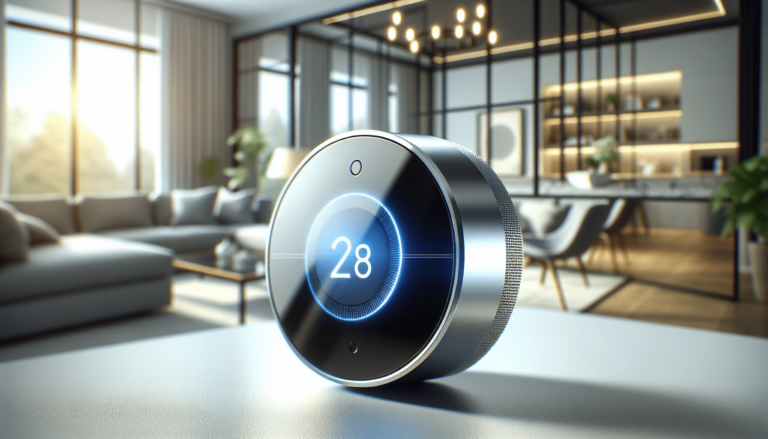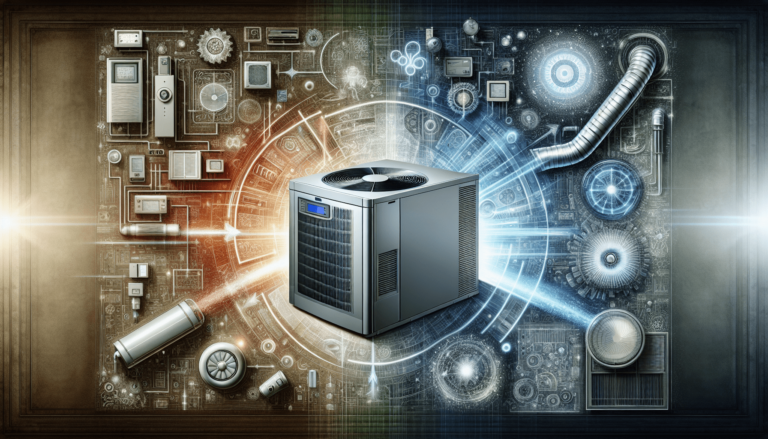

HVAC Services
Get Professional Repairs From The Area's Trusted HVAC Technicians. Ask About Our Services! We Offer Professional Heating & Cooling System Repairs And Guarantee Long-Lasting Results.
Got Question? Call us: (850) 678-2665Financing
Solar-Powered HVAC: A Look Into The Future
Explore the future of comfort with solar HVAC. This insightful post reveals how sunlight can power efficient and eco-friendly home climate solutions.

Have you ever wondered what the home of tomorrow will look like in terms of energy efficiency and comfort? While flying cars are still a figment of imagination and pastel-colored jumpsuits largely remain in the realm of sci-fi, the future of Heating, Ventilation, and Air Conditioning might already be within our grasp. With the advent of solar-powered HVAC systems, the prospect of a sustainable and efficient way to maintain our home’s climate seems almost inevitable.
Understanding Solar-Powered HVAC Systems
HVAC stands for Heating, Ventilation, and Air Conditioning, and these systems are integral to modern living. They keep us warm on chilly nights and cool during those sweltering summer days. But traditionally, they rely heavily on electricity—a dependency with significant environmental and financial costs. Enter solar power, a cleaner, renewable source of energy that can be harnessed to drastically minimize these downsides.
What Makes Solar-Powered HVAC Different?
Traditional HVAC systems depend on electricity sourced through fossil fuels, leading to greenhouse gas emissions. Solar-powered HVACH systems, on the other hand, convert sunlight directly into electricity using solar panels. This not only cuts down on emissions but also significantly reduces energy costs—a win-win! The idea is simple yet powerful: use the sun’s power to run our HVAC systems and transform our homes into bastions of efficiency.
The Components of a Solar-Powered HVAC System
To really grasp how these systems work, it helps to know about their main components:
- Solar Panels: These are the heart of the system, capturing sunlight and transforming it into electricity.
- Inverter: Converts the raw solar energy into a form that your HVAC units can use.
- Battery Storage: Stores excess energy for later use, ensuring the system functions efficiently even during cloudy days.
- HVAC Unit: The machinery that carries out heating, cooling, and ventilation.
Each component plays a vital role in ensuring that your home remains the perfect temperature while doing your bit for the planet.
Benefits of Solar-Powered HVAC Systems
By now, you’re likely asking why you should even consider switching to a solar-powered HVAC. Beyond the obvious environmental benefits, there are numerous other advantages that make this upgrade enticing.
Dramatic Energy Savings
Your electricity bills could become a thing of the past, considering that these systems can significantly reduce or even eliminate your heating and cooling costs. Imagine not cringing every time you open your utility bill! It could become a monthly routine you actually look forward to.
Environmentally Friendly
A major player in the fight against climate change, solar-powered systems help mitigate your carbon footprint. Given that HVAC systems account for a considerable percentage of residential energy use, switching to solar can make a substantial impact.
Long-term Investment
While the initial costs may seem high, the longevity and efficiency of solar systems mean that they pay for themselves over time. With proper maintenance, these systems can last 25 years or more, making them an investment that yields long-term rewards.
Government Incentives
Many governments offer tax credits and rebates to encourage homeowners to switch to solar energy. This can significantly offset the initial installation costs, making solar-powered HVAC systems more financially accessible.

Potential Drawbacks and Challenges
No picture is complete without showing the shadows, right? Let’s consider some of the potential challenges you might face before rushing to install a solar-powered HVAC system.
Initial Installation Costs
Although the lifetime savings are undeniable, the upfront cost can be significant. Solar panels and compatible HVAC systems require an initial investment that might deter some homeowners. However, various financing options and incentives are available to ease this burden.
Weather Dependency
Solar power naturally depends on the availability of sunlight, which varies seasonally and geographically. Cloudy days and long winters can impede performance, although battery storage systems can help mitigate this to an extent.
Space Requirements
To harness enough solar energy, sufficient roof space is necessary for panel installation. Your home’s architecture, positioning, and local building codes could potentially limit or complicate installation.
Are Solar-Powered HVAC Systems Effective?
Effectiveness often comes down to suitability. Simply put, solar-powered HVAC systems work brilliantly in certain conditions. Homes situated in sunny locales with ample roof space are the ideal candidates for adopting this technology. In fact, areas with intense sunshine throughout the year can see massive reductions in electricity costs.
Performance vs. Traditional Systems
According to various studies, solar-powered systems can effectively compete with, and in many cases outperform, their traditional counterparts. The key lies in proper planning and expert installation. While they may not suit every home in every situation, the potential for efficiency gains is enormous with the right setup.
Real-World Case Studies
Let’s take a quick detour to see what this looks like on the ground. Companies like Tempacure Heating and Air Conditioning are already paving the way with innovative installations. By analyzing several real-world examples, you’ll notice a common narrative: substantial energy savings, reduced carbon footprints, and happier ecology-conscious homeowners.

Future Trends in Solar-Powered HVAC Systems
As technology evolves, new advancements continue to push the envelope on what’s possible. From innovative designs to smart home integrations, the future is bright for solar-powered HVAC systems.
Smart Home Integration
Imagine controlling your HVAC system from your smartphone, optimizing energy use based on data analytics, and even receiving feedback for repairs. The integration of artificial intelligence and IoT (Internet of Things) into solar-powered systems isn’t just futuristic talk—it’s on the brink of becoming a reality.
Advances in Storage Solutions
Battery technology continues to improve, making energy storage a more feasible and efficient aspect of solar power. Developing more compact, affordable, and efficient batteries will drive better performance and accessibility.
Cutting-Edge Material Science
The use of novel materials like perovskites offers potential for cheaper, lighter, and more efficient solar cells. Such advancements could entirely change the energy capture process, boosting efficiency rates dramatically.
Steps to Transition to Solar-Powered HVAC
Thinking about making the change to a solar-powered HVAC system? Here’s a simple guide to get you started:
Assess Your Energy Needs
Evaluate how much energy your home consumes for heating and cooling. This assessment will determine the size and type of system you’ll need.
Conduct a Site Analysis
Examine your property to see if it meets the necessary conditions—sufficient sunlight, roof space, or a suitable alternative location for panels.
Consult with Experts
Reach out to experts, like those at Tempacure Heating and Air Conditioning, who can provide assessment, advice, and quotes. Professionals will guide you through the technical aspects of installation and recommend systems tailored to your needs.
Explore Financial Options
Investigate various government incentives and financing options to make the transition financially viable. A mix of rebates, tax credits, and flexible payment plans could offer needed aid.
Install and Monitor
With everything lined up, move to installation. Post-installation, keep tabs on performance and maintenance to ensure everything runs smoothly.
Final Thoughts
The transition to solar-powered HVAC systems represents a courageous step toward a greener and more sustainable future. Understanding the technology, weighing its benefits and challenges, and taking mindful steps towards change can help you make a decision that not only benefits your family but also contributes positively to the environment. It’s more than just catching rays; it’s about catching the future and holding on tight. Isn’t it high time we let the sun do more than just make us squint reluctantly towards the sky? In adopting solar, we transform not just energy consumption, but perhaps, our relationship with nature itself.







